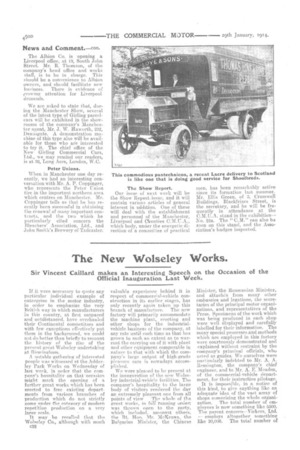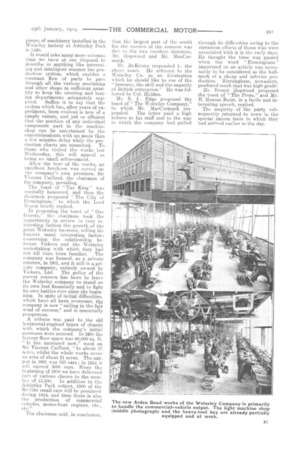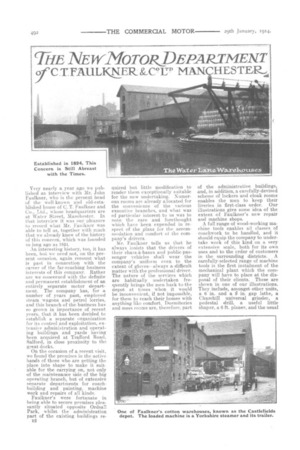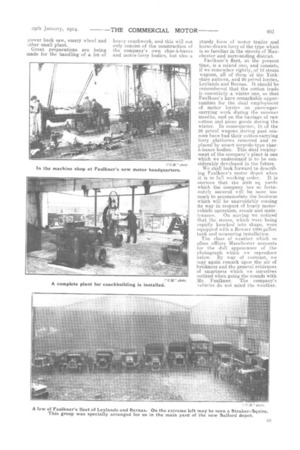The New Wolseley Works.
Page 26

Page 27

Page 28

Page 29

If you've noticed an error in this article please click here to report it so we can fix it.
Sir Vincent Caillard makes an Interesting Speech on the Occasion of the Official Inauguration Last Week.
If it were necessary to quote any particular individual example of enterprise in the motor industry, in order to emphasize the very British way in which manufacturers in this country, at first outpaced and outdistanced, have overhauled their Continental competitors and with few exceptions effectively put them in the background, we could nnt do better than briefly to recount the history of the rise of the present great Wolseley undertaking at 'Birmingham.
A notable gathering of interested people was Witnessed at the Adderley Park Works on Wednesday of last week, in order that the company's hospitality on that .occasion might mark the opening of a, further great works which has been erected to free existing departments from various branches of production which do not strictly come under the category of modern repetition production on a very large scale.
It may be recalled that the Wolseley Co., although with much 032 valuable experience behind it in respect of commercs'al-vehicle construction in its earlier stages, has only recently again taken up this branch of manufacture. The new factory will primarily accommodate the machine plant, erecting and other shops for the industrialvehicle business of the company, at any rate until such time as that has grown to such an extent as to warrant the carrying on of it with plant and other equipment comparable in nature to that with which the company's large output of high-grade pleasure cars is nowadays accomplished.
We were pleased to be present at the inauguration of the new Wolseley industrial-vehicle facilities. The company's hospitality to the large body of visitors rendered the day an extremely pleasant one from all points of view The whole of the great works, in frill' running order; was thrown open to the party, which included. amongst oth era, the Rt. Hoe. Mr. 11slelienisa, the Bulgarian Minister, the Chinese Minister, the Roumanian Minister, and attaches from many other embassies and legations, the secretaries of the principal motor organizations, and representatives of the Press. Specimens of the work which was being produced in each shop were well displayed and carefully labelled for their information. The ninny special processes and methods which are employed in this factory were courteously demonstrated and explained without restraint by the company's principal officials, whu acted as guides. We ourselves were particularly indebted to Mr. A. A. Remington, the company's chief engineer, and to Mr. A. E. Mea,den, of the commercial-vehicle department, for their instructive pilotage.
It is impossible, in a notice of this kind, to give anything like an adequate idea of the vast array of shops comprising the whole organization. The total number of employees is now something like 5500. The parent concern—Vickers, Ltd. — employs altogether something like 30,000. The total number of pieces of machinery installed in the Wolseley factory at Adderley Park is 1420.
It would take Many more columns than we have at our disposal to describe in anything like interesting and intelligent manner the production system, which enables a constant flow of parts to pass through all the various machining and other shops in sufficient quasi, tity to keep the erecting and. testing departments adequately sup plied. Suffice it to say that the system which has, after years of experiment, been evolved is now of a simple nature, and yet so efficient that the position of any individual component part in the machine shop can be ascertained by the superintendents with no more than a few minutes delay while the production charts are consulted. To those who visited the works last Wednesday, this will appeal as being no small achievement.
After the tour of the. works, an excellent luncheon was served on the company's own premises, Sir Vincent Caillard, the chairman of the company, presiding. The toast of " The King" was cordially honoured, and then the chairman proposed The City of Birmingham," to which the Lord. Mayor briefly replied.
Inproposing the toast of " Our Guests," the chairman took the opportunity to review in very interesting fashion the growth of the great Wolseley business, telling his hearers many interesting factors concerning the relationship between Vickers and the Wolseley undertaking with which they had not till then been familiar. The company was formed, as a private concern, in 1901, and it still is a private company, entirely owned by Vickers, Ltd. The policy of the parent concern has. been to leave the Wolseley company to stand on its own feet financially and to fight its own battles ever since the beginning. In spite of initial difficulties, which have all been overcome, tbQ company is now "sailing in the fair wind of success," and is essentially prosperous.
A tribute was paid to the old horizontal-engined types of chassis with which the company's initial successes were secured. In 1901 the factory floor space was 90,000 sq. ft. " It has increased now," went on Sir Vincent Caillard, "to about 17 acres, whilst the whole works cover an area of about 21 acres. The output in 1901 was :123 cars ; in 1914 it will exceed 3000 ears. Since the beginning of 1908 we have delivered cars of various classes to the num
ber of 13,500. In addition to the Adderley Park output, 1500 of the Stollite small cars will be produced during 1914, and then there is also I he production of commercial ve hides, motor-boat engines, etc., etc."
The chairman said, in conclusion. that thn largest part of the credit for the success of the concern was dun to the two resident directors, Mr. Hopwood and Mr. MacCorin Mr. McKenna responded t, the above toast. He referred to the Wolseley Co. as an illustration which he should like to use of the "firmness, the, skill and the sagacity of British enterprise." He was followed by Cot. Holden.
Mr. S. F. Edge proposed the toast of " The Wolseley Company," to which Mr. MacCormack res ponded. The latter paid a high tribute to his staff and to the way in which the company had pulled through its difficulties owing to the strenuous efforts of those who were associated with it in the early days, He thought the time was passed when the word " Birmingham" impressed on an article was necessarily to be considered as the hallmark of a cheap and inferior production. Birmingham, nowadays, produced much that was high-grade. Mr. Ernest Hopwood proposed the toast of " The Press," and Mr. H. Massac Buist, in a facile and interesting speech, replied.
The majority of the party subsequently returned to town in the special saloon train in which they had arrived earlier in the day.
Very nearly a year ago we published ari interview with Mr. John Faulkner, who is the present head of the well-known and old-established house of C. T. Faulkner and Co., Ltd., whose headquarters are at Water Street, Manchester. In that interview it was our pleasure to record what Mr. Faulkner was able to tell us, together with much that we already knew of the history of this concern, which was founded so long ago as 1824.
An interesting history, too, it has been, but we need not, on the present occasion, again recount what is past in connection with the career of the far-reaching business interests of this company. Rather are we concerned with the definite and permanent establishment of an entirely separate motor department. The company has, for a number of years past, employed steam wagons and petrol lorries, and this branch of the business has so grown in importance of recent years, that it has been decided to establish a separate organization for its control and exploitation, extensive administration and operating buildings and yards having been acquired at Trafford Road, Salford, in close proximity to the great docks.
On the occasion of a recent visit, we found the premises in the active hands of those who are getting the place into shape to make it suitable for the carrying on, not only of the maintenance side of the big operating branch, but of extensive separate departments for coachbuilding and painting, machine work and repairs of all kinds.
Faulkner's were fortunate in being able to secure premises pleasantly situated opposite Ordsall Park, whilst the administration part of the existing buildings re E2 quired but little modification to render them exceptionally suitable for the new undertaking. Numerous rooms are already allocateAl for the convenience of the various executive branches, and what was of particular interest to us was to note the care and forethought which have been expended in respect of the plans for the accommodation and comfort of the company's drivers. Mr. Faulkner tells us that he always insists that the drivers of their chars-a-bancs and public-passenger vehicles shall wear the company's uniform even to the extent of gloves—always a difficult matter with the professional driver. The nature of the services which are habitually undertaken frequently brings the men back to the depot at times when it would be inconvenient, if not impossible, for them to reach their homes with anything like comfort. Dormitories and mess rooms-are, therefore, part of the administrative buildings, and, in addition, a carefully-devised scheme of lockers and cloak rooms enables the men to keep their liveries in first-class order. Our illustrations give some idea of the extent of Faulkner's new repair and machine shops.
A full range of wood-working ma• chine tools enables all classes of coachwork to be handled, and it should equip the company to undertake work of this kind on a very extensive scale, both for its own uses and to the order of customers in the surrounding districts. A carefully-selected range of machine tools is the first instalment of the mechanical plant which the company will have to place at the disposal of their clients. These are shown in one of our illustrations. They include, amongst other units, a 6 in. and a 6 in. gap lathe, a Churchill universal grinder, a pedestal drill, a useful little shaper, a 6 ft. planer, and the usual
power hack saw, emery wheel and other small plant. Great preparations are being made for the handling of a lot of heavy coachwork, and this will not only consist of the construction of the company's own char-a-banes and motor-lorry bodies, but also a sturdy form of motor trailer and horse-drawn lorry of the type which is so familiar in the streets of Manchester and surrounding district.
Faulkner's fleet, at the present time, is a mixed one, and consists, if we remember rightly, of 12 steam wagons, all of them of the Yorkshire pattern, and 20 petrol lorries, Leylands and Bernas. It should be remembered that the cotton trade is essentially a winter one, so that Faulkner's have remarkable opportunities for the dual employment of motor lorries on passengercarrying work during the summer months, and on the haulage of raw cotton and piece goods during the winter. In consequence, lb of the 26 petrol wagons during past seasons have bad their cotton-carrying lorry platforms removed and replaced by smart torpedo-type chara,-bancs bodies. This dual employment of the company's plant is one which we understand is to be considerably developed in the future. We shall look forward to describing Faulkner's motor depot when it is in full working order. It is obvious that the 5000 sq. yards which the company has so fortunately secured ill be none too much to accommodate the business which will be unavoidably coming its way in respect. of heavy motorvehicle operation, repair and maintonanee. On leaving we noticed that the stores, which were being rapidly knocked into shape, were equipped with a Bowser 1000-gallon tank and measuring installation. The class of weather which so often afflicts Manchester accounts for the dull appearance. of the photograph which we reproduce below. By way of contrast, we may again remark upon the air of briskness and the general evidences of smartness which we ourselves noticed when going the rounds with Mr. Faulkner. The company's vehicles do not mind the weather.






































